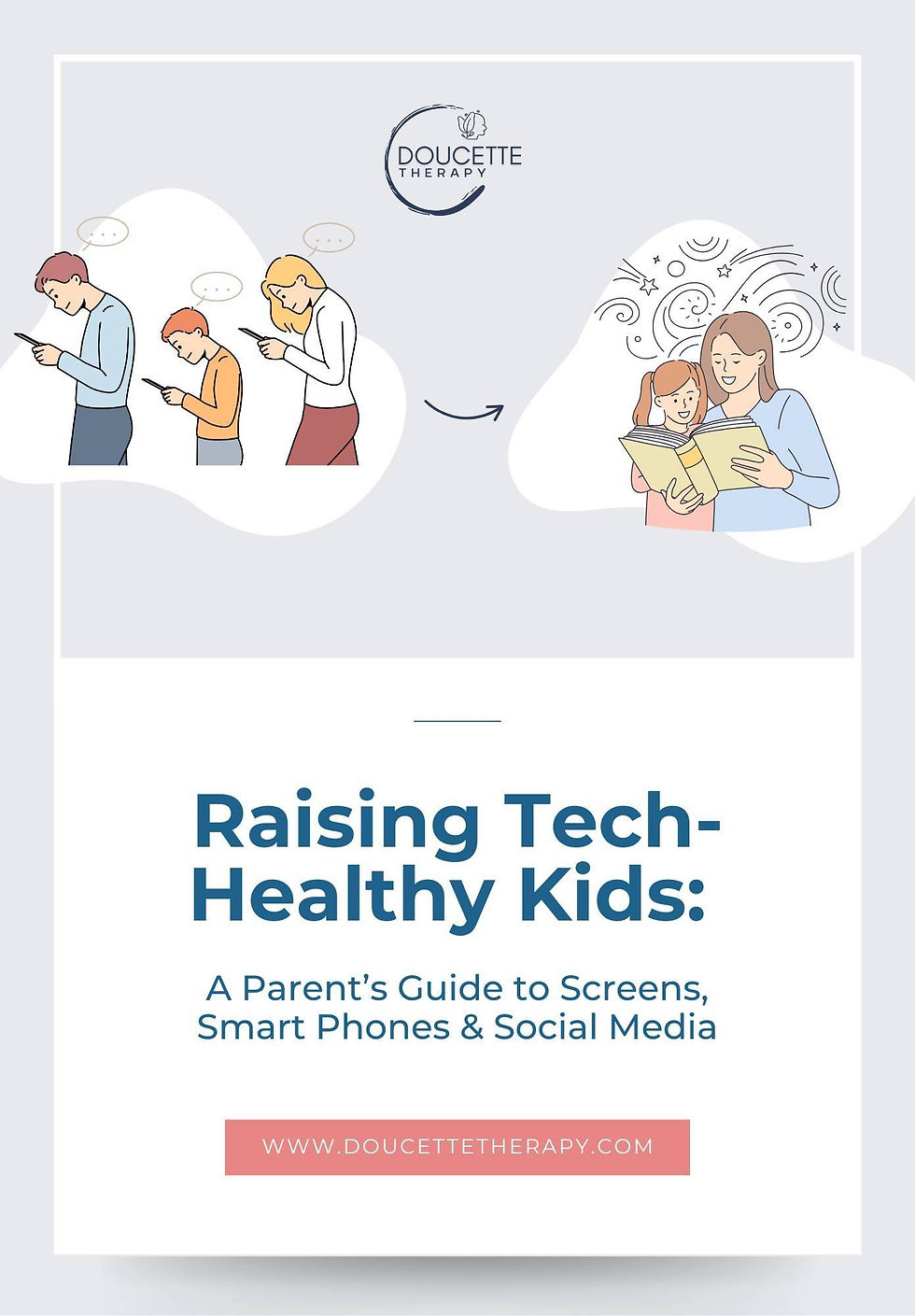In honour of Mother’s Day, some thoughts about Moms and the emotional labour in families.
- doucettetherapy
- Jun 23, 2025
- 3 min read
It’s been a full few weeks, and I have a few meaningful updates to share.
First, a belated Happy Mother's Day to all the Moms reading this. More to come on the subject of motherhood!
Secondly, I had the pleasure of speaking at Woodroffe Avenue Public School last week, in a talk hosted by the Parent Council. We focused on a topic I care deeply about: How to protect youth mental health in a digital age.
As a family therapist for 25 years and a mom for 20, I’ve witnessed firsthand how much parenting has changed in a short time. This generation of parents are raising children in a world that’s very different from the one we grew up in. This school has a standout group of parents who are creating community around a shared hope: to delay smartphone use and preserve childhood for as long as possible.
During the talk, I invited parents to reflect:
In what ways is your parenting similar to how you were raised? In what ways is it different?
One father offered a perspective that really stuck with me. He shared that his parents had more support—a wider circle of extended family and neighbours helping to raise him. “We spend more time with our kids now,” he said, “but we’re doing it more on our own.”
(As an aside, I have to note that this Dad was one of just two fathers that attended the presentation, but both of them showed such commitment to their families and the school community. I love seeing these fathers joining the mothers in advocacy for their kids).The insight from this father echoes what I see every day in my work. Parents are doing more than ever, often with less of a sense of community and the practical and emotional supports they need.
This is especially evident to me among parents whose children face exceptionalities like ADHD, autism and learning disabilities, or mental health difficulties, such as anxiety and depression. They face additional challenges and are even more in need of the “village” approach to raising their kids.
Today’s parents are spending more time with their children than any generation before.
And despite more mothers working outside the home than ever, they still carry the majority of the mental and emotional load involved in parenting.
I see this clearly in my practice:
• When a child is struggling, it’s most often the mother who reaches out for help.• They often bring their children to therapy and work with the therapist.
• Mothers are showing up more to do their own therapeutic work, partly so they can be more emotionally available to their children, and also because they are feeling the overwhelm and sometimes burnout associated with caregiving.
• Mothers attend my parenting workshops in higher numbers to learn the therapeutic skills to support their children.
• They learn approaches like emotion coaching quickly—and often ask me how to get their partners on board.This is the unseen work of parenting: the planning, the worrying, the showing up, the listening and comforting kids, the interventions around mental health at home.
It’s emotional labour. And mothers are carrying a disproportionate share.
This theme also came up in my recent interview on the podcast Scrolling to Death, with host Nicki Reisberg. Nicki is a powerful voice in the movement for children’s online safety. She has noted that in her experience, it’s mostly mothers doing the advocacy work—and also the heavylifting at home when it comes to setting screen time boundaries.
When she asked me why this might be, that fathers often seem reluctant to set greater boundaries around tech, I shared my perspective: setting limits, researching tools, managing emotional fall out—it’s all part of the mental load. And while there are certainly many fathers deeply engagedin this work, it is often mothers who take the lead.
One truth I know for sure: fathers love their children just as much. They feel just as worried and frustrated when their children are struggling - whether with tech use issues, mental health or other challenges.
However, there is so much room for us to empower fathers to be more involved in this particular aspect of caregiving. When they are, everyone in the family benefits.
If you have any thoughts about how we can break down the barriers, or personal experience with this dynamic in your home, I would love to hear from you.
📻 You can listen to the full conversation, :Trust Before Tech”, on Scrolling to Death.
Please check out my free guide around "Raising Tech-Healthy kids" and share with a friend.
A big theme in my talk to Woodroffe Avenue Public School parents was the value of collective action - it makes delaying the introduction of smartphones so much easier on both parents and kids!






Comments